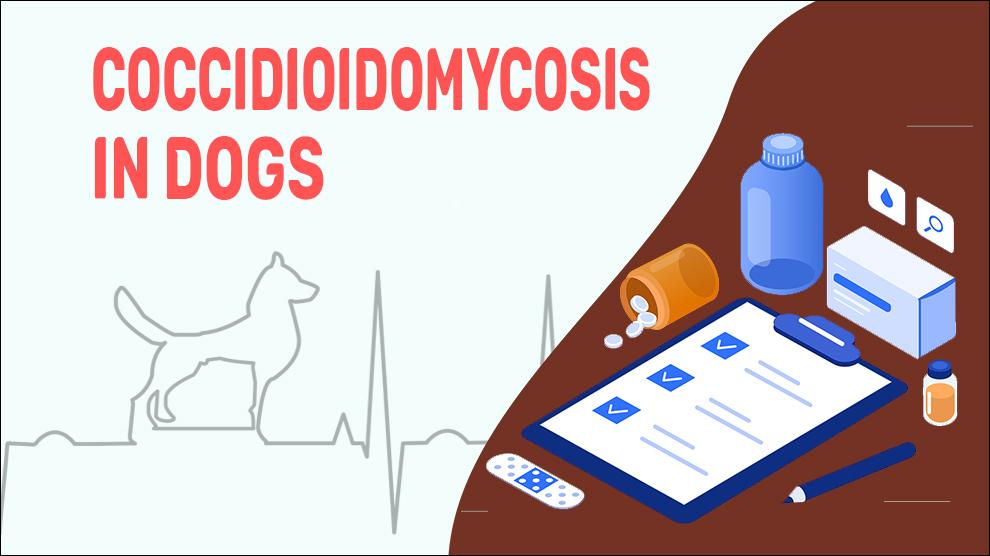Coccidioidomycosis is a pulmonary/mediastinal infection caused by a pleomorphic and diphasic fungus called Coccidioides immitis (also Coccidioides posadasi). Coccidioidomycosis is often used interchangeably with ‘San Joaquin Valley Fever or simply ‘valley fever.’
This fungus (in the mycelial phase) grow on dry oil and in semi-arid desert climate found in the southwestern USA, central as well as in Latin America. The dimorphic ascomycetes are found as filamentous molds in the environment (soil) and produce barrel-shaped arthroconidia (arthrospores), which is the infectious form.
When the spores enter the alveolar space, it multiplies by endosporulation, producing thick-walled structures called spherules containing endospores. Coccidioides is extremely infectious in a susceptible dog; inhalation of fewer than 10 arthroconidia may cause an infection.
The dogs that are at great risk for exposure to coccidioidomycosis in the endemic areas are young (as they are more active outdoors), even old dogs, or that have a weakened or compromised immune system, or dogs that dig in the dirt.
Symptoms Of Coccidioidomycosis
- High body temperature
- Pneumonia
- Erythema nodosum (red bumps in the skin).
- Lesions with seepage.
- Visibly swollen nose
- Hacking or gagging when eating.
- Signs that the dog is becoming head-shy.
- Lameness, Swelling of legs, or joint pain (arthralgia).
- Abscesses over infected areas of bones.
Treatment Options For Coccidioidomycosis
- Ketoconazole (Nizoral), Fluconazole (Diflucan) and Itraconazole (Sporanox) are the antifungal drugs used.
- When the infection has eroded through the bones of the nasal sinuses and has entered the brain, treatment with oral antifungal medication, such as fluconazole (brand name Diflucan), terbinafine (Lamisil), or itraconazole (Itrafungol, Sporanox) is required.
Treatment of systemic infections:
Earlier antifungal drug - Amphotericin B (AmBisome, Abelcet, Fungizone) was used.
They are replaced by newer antifungal drugs due to their high potential to cause kidney damage.
Sometimes, amphotericin B is encapsulated in liposomes (fatty envelopes formed by hydrated phospholipids) or other lipid formulations to reduce the damaging side effects to the kidneys.
Long-term treatment: Itraconazole (Sporanox and Itrafungol) has proven successful nowadays.
Home Remedies For Coccidioidomycosis
- Relieve your dog’s nose with organic, naturally formulated Nozzle Nectar of Snout Soother.
- Wash your dog’s sinuses with a saline flush to flush out mucus or use a bulb syringe/nasal aspirator to softly suck out or remove excess mucus. This makes your dog’s breathing easier.
- Place a vaporizer or run a humidifier in the area of your dog to increase air moisture and humidity.
- Share your time of hot shower with your dog in the bathroom.
- Check with your vet for antihistamines usage (like Zyrtec and Benadryl) to help ease your dog’s runny nose.
Prevention Of Coccidioidomycosis
- Those who are in endemic areas, check and dispose of overflowing waste bins and trash in the backyard carefully.
- When going for walks, keep your dog away from dust, sandy areas and other areas in the woods.
- Maintain your lawn or garden. Keep it neat and clean to avoid unwanted complications.
- Ask your vet for good quality flea and tick preventatives.
- Feed a high quality food and exercise regularly.
Affected Breeds Of Coccidioidomycosis
All breeds are susceptible although highly prevalent in ‘dolichocephalic’ dogs (dogs with long noses).
Outdoor and hunting dogs.
Additional Facts For Coccidioidomycosis
- Causes:
Coccidioidomycosis is considered an opportunistic pathogen, and dogs that have suppressed or compromised immune systems are highly susceptible.
The dimorphic fungi shed microscopic spores that float in the air and when inhaled, they sometimes evade or bypass the dog’s protective respiratory mechanisms and can cause disease.
In the annual reported cases, only approximately 20% are diagnosed outside the endemic areas.
Systemic Infections: The fungus enters the respiratory tract and via the bloodstream, travels to other organs creating a more severe systemic or generalized fungal infection. The granulomatous brain infection (Coccidioidal meningitis) is the most dangerous manifestation of coccidioidal infection.
- Mortality:
When the infection occurs only in the lungs, it is usually self-limiting and can be cured with standard fungal treatments. Disseminated Coccidioidomycosis can be really fatal.
3. Diagnosis:
- Cocci test (also called cocci titers, Valley Fever test, or cocci serology).
- Complete blood count (CBC).
- Urinalysis
- X-rays of the chest, bones, and joints.
4. Prognosis:
The prognosis for Coccidioidomycosis is really good. Most dogs undergoing treatment will recover within a few weeks. The chances of recovery of Dogs that have disseminated Coccidioidomycosis are guarded due to the damage to the vital organs. If left untreated, severe cases of Coccidioidomycosis can be fatal for dogs, so head to your vet immediately.
When To See A Vet
It’s better to set up an appointment with your veterinarian if you notice:
- High body temperature
- Erythema nodosum (red bumps in the skin).
- Lameness, Swelling of legs, or joint pain (arthralgia).
Food Suggestions For Coccidioidomycosis
Foods to avoid:
- Luncheon meat, bacon.
- Bread and baked goods.
- Sour cream, soft cheese, and Yogurt.
- Peanut butter, nuts, and legumes.
- Jams and jellies.
- Highly processed pet food.
- Starch as an additive or binding agent.
- High fructose corn syrup additives.
What to feed?
- Whole, unprocessed foods.
- Fresh food
- Low-carb dog food.
- Probiotics and digestive enzymes.
- Fresh, lean protein
- Add oregano or basil to their diet.
- Animal Essentials Detox Blend: (combination of herbs suspended in glycerine).
- This will help your dog detox.
- The raw diet, Semi-Homemade Food (commercial homemade diet with a dehydrated formula), or home-cooked meals.
Conclusion
While the possibility to get Coccidioidomycosis from your dog is potentially not possible, it is less likely if you practice good personal hygiene.
For cases with localized infections, the prognosis is generally good.
The prognosis for systemic Coccidioidomycosis varies inversely with delay in detection, severity, and evidence of the failure of vital organs.

















